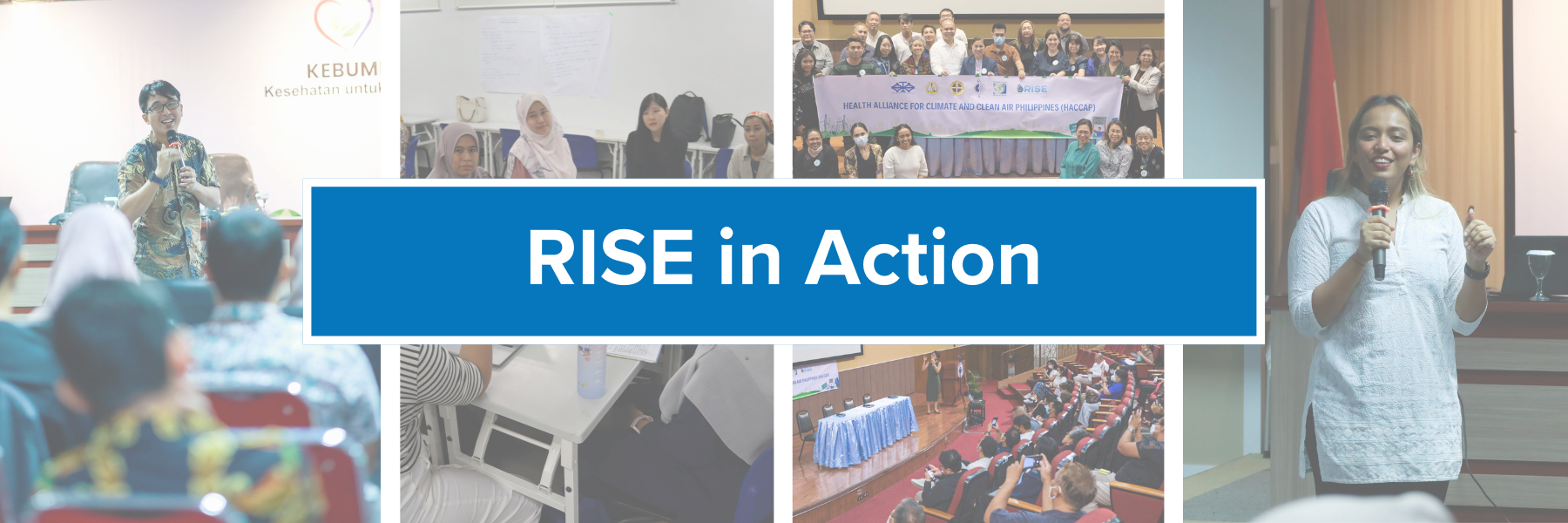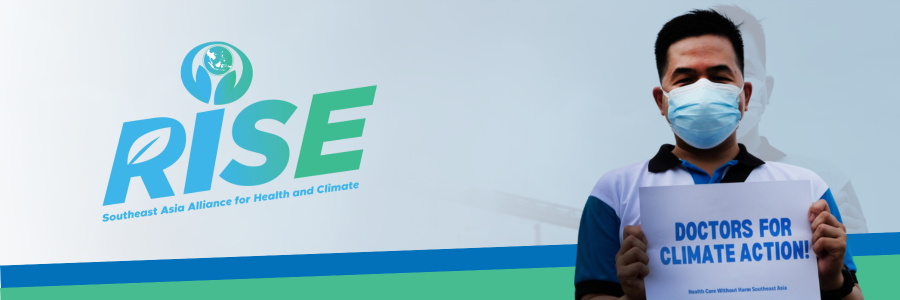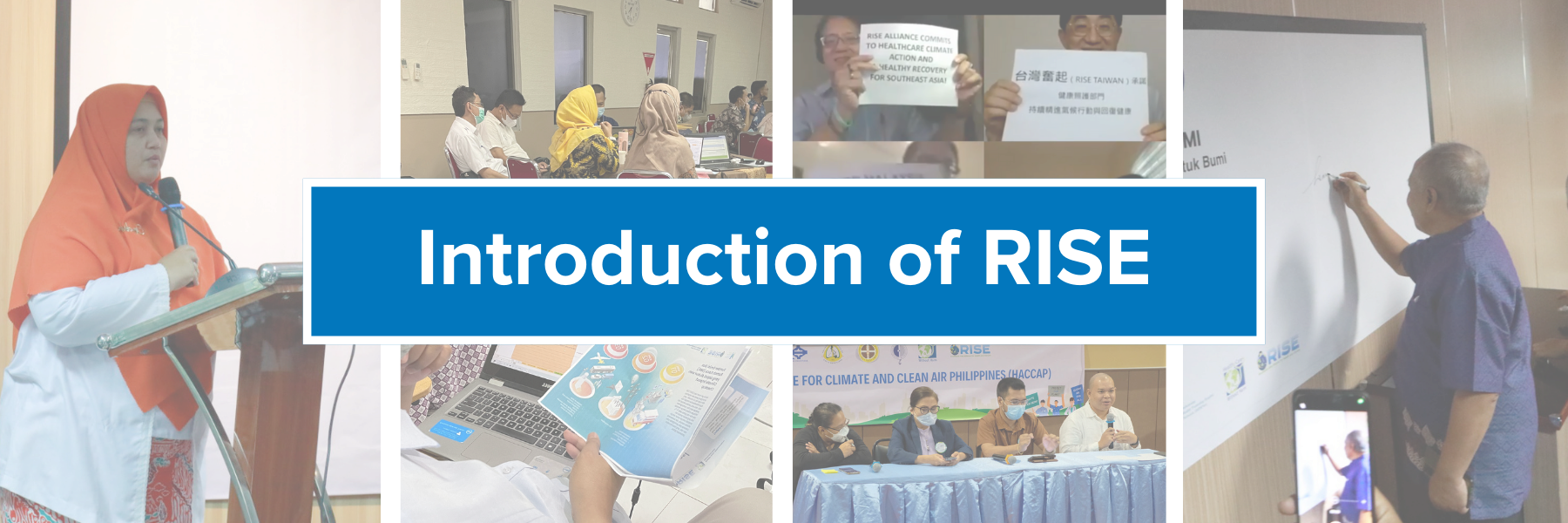RISE South East Asia Alliance for Health and Climate
The health sector has a unique opportunity to combat climate change because it is well positioned to understand the health impacts of climate change and take action to protect public health. Today, the voices of health workers become even more critical in promoting actions that address climate change and its impacts on health. Health professionals are both trusted communicators and important actors in the mitigation of this climate catastrophe. With a mandate to protect people's health and prioritize patient safety, dignity, and comfort, health professionals are duty-bound to speak out about the serious global health risks posed by climate change.
This is precisely why RISE Southeast Asia Alliance for Health and Climate (RISE) was launched, an initiative of Health Care Without Harm Southeast Asia, aimed to strengthen and mobilize healthcare leadership on climate action and healthy, equitable recovery for the region.
The story that has gripped the countries of Southeast Asia in the last decade is a story of climate disasters, economic and social struggles, and then a formidable pandemic. In spite of that, the journey of this region is also about standing up, courageously facing adversity, and uniting to build better — this is where “RISE” comes from. RISE signifies responsiveness, resilience and recovery. It also means facing the problem and mobilizing people and institutions towards the right solutions. The goal for RISE is to build a competent, inclusive alliance of healthcare leaders to advance climate action, health equity, and resilience in Southeast Asia in the context of increasing climate change risk and the post-pandemic recovery in the region.
Attended by up to 145 people from different countries, the launch of RISE featured representatives from RISE chapters formed in the Philippines, Malaysia, Indonesia and Taiwan along with Khoo Teck Puat Hospital from Singapore speaking about how RISE can help meet the climate-health gaps and challenges in their countries and in the region. Key strategies identified included building awareness and capacity; strengthening and upscaling resilient practices; decarbonizing health care; and expanding research, campaigns, and policy advocacy. Each representative pledged to commit to healthcare climate action and a healthy recovery for the region.
RISE Vision, Mission and Objectives
Vision
A resilient South East Asia, that fosters planetary health, climate action, and equity.
Mission
Empowering health leaders to champion health equity and climate justice in South East Asia, catalyzing transformative impact on communities and systems.
Objectives
Resilience: Develop strategies and initiatives to promote climate resilience, addressing air pollution, risk factors, and broader determinants of health for the well-being of communities in South East Asia.
Influence: Strengthen the capacity of health and climate leaders, empowering them with the knowledge and tools to effectively influence and advocate for climate and health issues.
Synergy: Foster cross-sector collaboration and synergy, breaking down silos to advance transformative change in climate and health across South East Asia.
Equity: Champion health equity and climate justice within the sector but also the broader community and wider economy, advocating for fairness, inclusivity, and the protection of vulnerable and marginalized populations.
RISE is currently working with 140 members from different countries, with the aim of expanding our country chapters in the Philippines, Indonesia, Malaysia, Singapore, Thailand, Vietnam, Taiwan, and South Korea. Partners of this network should ideally be healthcare practitioners or working on health in SEA and ready to come on board as partners to advance the vision and mission of RISE Southeast Asia. Partners would be reasonably expected to engage as follows:
- Participate in RISE chapter meetings and annual regional assembly as far as possible as well as in any of the following activities
- Co-organize, lead or participate in specific RISE activities as suited to your expertise e.g. engage in a working group on climate and health protocols/policies; conduct research; develop resilience frameworks or education modules; join/host a campaign on climate and health or a healthy recovery from pandemics; organize workshops; etc.
- Be a resource person for RISE Southeast Asia activities/events (as a speaker, trainer, organizer, advocate, researcher, etc.). Share your resources and contribute to the resource pool on health and climate information/ tools/ etc. Be a “Healthcare Climate Champion” and advocate for the transformation of health systems and society towards becoming resilient, decarbonized, and equitable. Be the voice of healthcare in climate platforms and the voice of climate action in healthcare platforms.
- Lead your own and other healthcare institutions in reducing carbon and toxic emissions, building resilience and becoming a leading model of sustainability. Upscale this through exchanges, capacity building, etc.
- Bring in other healthcare leaders and relevant sectors/actors to grow the alliance and its impact. Strengthen and synergize actions in focus and interconnected areas of public and planetary health.
What RISE Southeast Asia Alliance Can Offer You:
- The opportunity to be a part of a critical and progressive healthcare movement taking leadership to forge a future with healthy hospitals and healthy people living on a healthy planet.
- Access to HCWH’s global cutting edge resources including online platforms, educational tools, events, and experts on green hospitals, sustainable waste management, sustainable procurement, clean energy, air pollution, resilient healthcare facilities, etc. to take healthcare to the next level in meeting the immense challenges of increased pandemics and climate change impacts.
- Access to HCWH’s global networks, linkages and initiatives in the international healthcare sector for e.g. WHO, UNFCCC’s Race to Zero Campaign, etc.
- Benefits from moving towards climate-smart, low carbon health systems such as: financial savings, more resilient and cost-efficient systems for the future, improved procurement standards, reduced waste, healthier and safer healthcare facilities, being able to reduce health threats to society, enhanced public profile, etc.
- The opportunity for personal advancement and enhanced visibility as a healthcare practitioner and a healthcare climate champion for your country and the region, especially for women healthcare leaders in an emerging field. Cross-country exchanges and working groups with healthcare and other relevant leaders in the region will be immense learning and networking opportunities.
BE A RISE MEMBER: https://forms.gle/mfW8XhfPvNZ8zpWw9
For questions, clarifications you may send an email or an expression of interest to: infoasia@hcwh.org

RISE in the Philippines – HACCAP
The Philippines is particularly vulnerable to climate change considering the limited resources and infrastructure to cope with its impacts. Between 2000-2019, 3 out of the 10 most affected countries by impacts of climate change came from Southeast Asia, with the Philippines taking the 4th place. For health and well-being, this means: increased risks of undernutrition, excess morbidity and mortality, displacement of populations, increased vulnerability of women and children from sexual abuse and sheer lack of reproductive services and facilities, heightened risks for asthma, tuberculosis, and other respiratory diseases, as well as myocardial infarction, atherosclerosis that causes stroke, and most cancers, among others.
Similarly, air pollution is also a huge public health crisis in the Philippines. In 2018, a study by the WHO reported that there were 45.3 air pollution-related deaths for every 100,000 people in the Philippines; this was the third highest in the world. Air pollution produced by coal combustion in power plants - which is also the major driver of the climate crisis - can affect the respiratory and cardiovascular systems and cause abnormal neurological development in children, poor growth of the fetus before birth, and can cause cancer. The coal used for heating and cooking indoors generates indoor air pollutants that cause respiratory ailments and cancer. Moreover, coal combustion contributes to climate change, which can harm human health on a national and global scale.
The urgency to address these twin crises lies in the recognition that the well-being and survival of the Filipino people are intricately linked to the health of our planet. For this reason, a group of climate advocates from the health sector in the country has decided to work together to advance initiatives that prioritize public and environmental health.
The Health Alliance for Climate and Clean Air Philippines (HACCAP) is initiated by the partnership of the Philippine College of Chest Physicians (PCCP), Philippine College of Physicians (PCP), Philippine Society of Allergy, Asthma and Immunology (PSAAI), Lung Center of the Philippines (LCP), and Health Care Without Harm Southeast Asia (HCWH-SEA). This partnership aims to:
- Increase awareness of health professionals, policymakers, and other relevant stakeholders about the intersection of air pollution, climate change, and health in the Philippines;
- Conduct research on air pollution, climate change, and their impact on health; and
- Actively engage in and advocate for the development of better policies and guidelines on air pollution, climate change, and health.
RISE in Indonesia – KEBUMI
In the context of Indonesia, a country highly susceptible to climate risks, the effects of climate change on health are already evident. Sea-level rise, extreme heat, and increased air pollution pose significant challenges to the population's well-being. These environmental stressors result in a range of health issues, from malnutrition and respiratory ailments to displacement and heightened vulnerability to sexual abuse. The reliance on coal power plants, industrial activities, biomass burning, and fossil fuel use exacerbates air pollution, which further burdens public health, particularly in urban areas. These interconnected environmental and health challenges place immense pressure on Indonesia's healthcare system, amplifying the need for urgent action.
Recognizing the urgency and the intrinsic relationship between climate change, human health, and environmental sustainability, the Indonesian Health Promoting Hospitals Network (IHPH-Net) is spearheading the integration of health professionals into the climate discourse through KEBUMI: Kesehatan Untuk Bumi. With support from Health Care Without Harm Southeast Asia (HCWH-SEA), this initiative aims to build an empowered alliance of health professionals effectively advocating and championing issues of climate justice, health equity, resilience, and healthy recovery in Indonesia. By empowering health professionals, we can also empower patients, colleagues, the media, and policymakers at all levels to lead the way toward a just, healthier, and equitable world.
This will be accomplished through the following goals:
- Goal 1: The movement of health professionals in Indonesia working for climate action grows and becomes more vibrant and robust, strengthening the regional movement to phase-out fossil fuels and for a just transition to clean, renewable energy
- Goal 2: Health professionals advocate for and catalyze action by policymakers to address climate and health issues at the local, national, and regional levels by protecting the public (especially vulnerable populations), providing adequate health services, and fostering a just transition to clean, renewable energy.
- Goal 3: Health professionals are able to generate and communicate evidence- and science-based data and information for the broader public and policymakers to better understand the relationship between climate change, air pollution, health, and justice.
We welcome any inquiries, questions, or potential partnerships related to the project. Please don't hesitate to reach out to us at adm.kebumi@gmail.com and info@kebumi.org for further information or to discuss collaboration opportunities.



